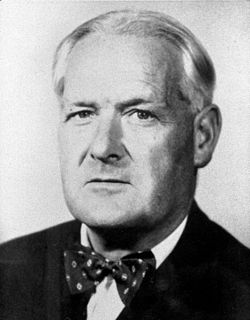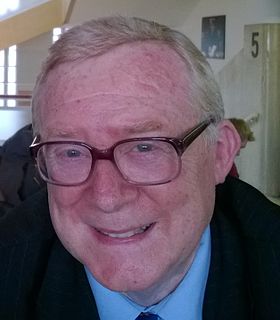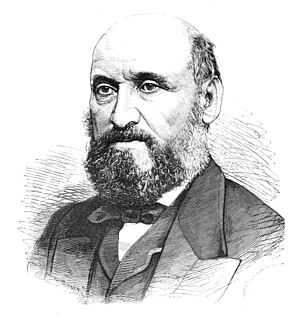Top 169 Statistical Quotes & Sayings - Page 3
Explore popular Statistical quotes.
Last updated on April 17, 2025.
I have been doing technology foresight for a number of years now on the level of scenario design, primarily. I want to become more rigorous with research methodology and statistical methods. I want to shift from creating clever SF scenarios to being a professional forecaster able to make rigorous predictions.
The purely random sample is the only kind that can be examined with confidence by means of statistical theory, but there is one things wrong with it. It is so difficult and expensive to obtain for many uses that sheer cost eliminates it. A more economical substitute, which is almost universally used in such fields as opinion polling and market research, is called stratified random sampling.
His answers were quite often like that. When she spoke of beauty, he spoke of the fatty tissue supporting the epidermis. When she mentioned love, he responded with the statistical curve that indicates the automatic rise and fall in the annual birthrate. When she spoke of the great figures in art, he traced the chain of borrowings that links these figures to one another.
Those subject to capital punishment are real human beings, with their own backgrounds and narratives. By contrast, those whose lives are or might be saved by virtue of capital punishment are mere 'statistical people.' They are both nameless and faceless, and their deaths are far less likely to be considered in moral deliberations.
The repeat run of Fawlty Towers (BBC2) drew bigger audiences than ever and deservedly so. Statistical surveys reveal that only the television critic of the Spectator is incapable of seeing the joke, which is that Basil Fawlty has the wrong temperament to be a hotel proprietor, just as some other people have the wrong temperament to be television critics.
It makes no sense to seek a single best way to represent knowledge-because each particular form of expression also brings its particular limitations. For example, logic-based systems are very precise, but they make it hard to do reasoning with analogies. Similarly, statistical systems are useful for making predictions, but do not serve well to represent the reasons why those predictions are sometimes correct.
As far as many statistical series that are related to activities of mankind are concerned, the date that divides human history into two equal parts is well within living memory. The world of today is as different from the world I was born in as that world was from Julius Caesar s. I was born in the middle of human history, to date, roughly. Almost as much has happened since I was born as happened before.
To reduce the interpretation of the causality of all kinds of climate changes and of global warming to one variable, CO2, or to a small proportion of one variable - human-induced CO2 - is impossible to accept. Elementary rationality and my decades-long experience with econometric modelling and statistical testing of scientific hypotheses tell me that it is impossible to make strong conclusions based on mere correlation of two (or more) time series.
A fashionable idea in technical circles is that quantity not only turns into quality at some extreme of scale, but also does so according to principles we already understand. Some of my colleagues think a million, or perhaps a billion, fragmentary insults will eventually yield wisdom that surpasses that of any well-thought-out essay, so long as sophisticated secret statistical algorithms recombine the fragments. I disagree. A trope from the early days of computer science comes to mind: garbage in, garbage out.
In psychology, there's something called the broken-leg problem. A statistical formula may be highly successful in predicting whether or not a person will go to a movie in the next week. But someone who knows that this person is laid up with a broken leg will beat the formula. No formula can take into account the infinite range of such exceptional events.
My greatest concern was what to call it. I thought of calling it 'information,' but the word was overly used, so I decided to call it 'uncertainty.' When I discussed it with John von Neumann, he had a better idea. Von Neumann told me, 'You should call it entropy, for two reasons. In the first place your uncertainty function has been used in statistical mechanics under that name, so it already has a name. In the second place, and more important, no one really knows what entropy really is, so in a debate you will always have the advantage.'
The incomplete knowledge of a system must be an essential part of every formulation in quantum theory. Quantum theoretical laws must be of a statistical kind. To give an example: we know that the radium atom emits alpha-radiation. Quantum theory can give us an indication of the probability that the alpha-particle will leave the nucleus in unit time, but it cannot predict at what precise point in time the emission will occur, for this is uncertain in principle.
The statistical method is required in the interpretation of figures which are at the mercy of numerous influences, and its object is to determine whether individual influences can be isolated and their effects measured. The essence of the method lies in the determination that we are really comparing like with like, and that we have not overlooked a relevant factor which is present in Group A and absent from Group B. The variability of human beings in their illnesses and in their reactions to them is a fundamental reason for the planned clinical trial and not against it.
I may remark parenthetically that the modern apparatus of the theory of small samples, once it goes beyond the determination of its own specially defined parameters and becomes a method for positive statistical inference in new cases, does not inspire me with any confidence unless it is applied by a statistician by whom the main elements of the dynamics of the situation are either explicitly known or implicitly felt.
We went through the records and we found over five hundred of his patients who were alive and well five years after their treatment, with no cancer. And Dr. Burton didn't selectively give us these. These were "take what you want. Here are the patients I treated." So there was statistical improvement - more so than any cancer institution in the United States could show.
The evidence from both approaches, statistical and experimental, does not appear sufficiently significant to me to warrant forsaking the pleasure of smoking. As a matter of fact, if the investigations had been pointed toward some material that I thoroughly dislike, such as parsnips, I still would not feel that evidence of the type presented constituted a reasonable excuse for eliminating the things from my diet. I will still continue to smoke, and if the tobacco companies cease manufacturing their product, I will revert to sweet fern and grape leaves.
Much research in psychology has been more concerned with how large groups of people behave than about the particular ways in which each individual person thinks... too statistical. I find this disappointing because, in my view of the history of psychology, far more was learned, for example, when Jean Piaget spent several years observing the ways that three children developed, or when Sigmund Freud took several years to examine the thinking of a rather small number of patients.
Decision-making is difficult because, by its nature, it involves uncertainty. If there was no uncertainty, decisions would be easy! The uncertainty exists because we don't know the future, we don't know if the decision we make will lead to the best possible outcome. Cognitive science has taught us that relying on our gut or intuition often leads to bad decisions, particularly in cases where statistical information is available. Our guts and our brains didn't evolve to deal with probabilistic thinking.
The writing of solid, instructive stuff fortified by facts and figures is easy enough. There is no trouble in writing a scientific treatise on the folk-lore of Central China, or a statistical enquiry into the declining population of Prince Edward Island. But to write something out of one's own mind, worth reading for its own sake, is an arduous contrivance only to be achieved in fortunate moments, few and far in between. Personally, I would sooner have written Alice in Wonderland than the whole Encyclopedia Britannica.
Because you've been exposed to Western tonal music, you know after a certain chord sequence what the next possibilities are. Your brain has compiled a statistical map of which ones are most likely and least likely. If the song keeps hitting the most likely notes, you'll get bored, and if it's always the least likely ones, you'll get irritated.
But the indeterminate future is somehow one in which probability and statistics are the dominant modality for making sense of the world. Bell curves and random walks define what the future is going to look like. The standard pedagogical argument is that high schools should get rid of calculus and replace it with statistics, which is really important and actually useful. There has been a powerful shift toward the idea that statistical ways of thinking are going to drive the future.
One problem I have with talking about myself in the context of class divisiveness is that I can be - and indeed have been - used by others to demonstrate its absence and that it's only a matter of hard work to move upward socially. After all, how could I complain about anything, if the retort is: "But look where you got to? It can't be all that bad." But this is nonsense as an argument quite aside from its empirical absurdity because no single case can invalidate a statistical claim.
The reason for your poor projections is often right in front of you. Whether you are using statistical analysis or just an average, sometimes the way you are calculating your numbers doesn't make any sense. Sometimes it's best to get up, take a walk, and revisit your calculations later. I have returned to my work many times and said: "Why the hell would I calculate it like that?"
If you flip a coin three times and it lands on heads each time, it’s probably chance. If you flip it a hundred times and it lands on heads each time, you can be pretty sure the coin has heads on both sides. That’s the concept behind statistical significance—it’s the odds that the correlation (or other finding) is real, that it isn’t just random chance.
Most of us cluster somewhere in the middle of most statistical distributions. But there are lots of bell curves, and pretty much everyone is on a tail of at least one of them. We may collect strange memorabilia or read esoteric books, hold unusual religious beliefs or wear odd-sized shoes, suffer rare diseases or enjoy obscure movies.
Whether we like it or not, quantification in history is here to stay for reasons which the quantifiers themselves might not actively approve. We are becoming a numerate society: almost instinctively there seems now to be a greater degree of truth in evidence expressed numerically than in any literary evidence, no matter how shaky the statistical evidence, or acute the observing eye.
It was noted long ago that the front row of burlesque houses was occupied predominantly by bald-headed men. In fact, such a row became known as the bald-headed row. It might be assumed from this on statistical evidence that the continued close observation of chorus girls in tights caused loss of hair from the top of the head.
I don't know of any science writing going on in women's magazines, unless you count medical stories about things like breast cancer. I still think there's a huge problem about how we can actively engage a wider range of women. I'm not saying women must be a separate audience - I'm just responding to the reality that the majority of people who do read science magazines are male. That's not a value judgment; it's a statistical fact.
Statistical science is indispensable to modern statesmanship. In legislation as in physical science it is beginning to be understood that we can control terrestrial forces only by obeying their laws. The legislator must formulate in his statutes not only the national will, but also those great laws of social life revealed by statistics.
The advantages of a uniform statistical nomenclature, however im- perfect, are so obvious, that it is surprising no attention has been paid to its enforcement in bills of mortality. Each disease has in many instances been denoted by three or four terms, and each term has been applied to as many different diseases ; vague, inconvenient names have been employed, or complications have been registered, instead of primary diseases. The nomenclature is of as much importance in this depart- ment of inquiry as weights and measures in the physical sciences, and should be settled without delay.
Among the current discussions, the impact of new and sophisticated methods in the study of the past occupies an important place. The new 'scientific' or 'cliometric' history-born of the marriage contracted between historical problems and advanced statistical analysis, with economic theory as bridesmaid and the computer as best man-has made tremendous advances in the last generation.
If someone does a study which, for statistical reasons, I think is hopelessly underpowered or nonidentified, my best and most useful advice will not be tips on how to calculate p-values better, or how to construct an explanation for some particular data pattern. Rather, my advice will be to start over, to reconsider what you think you already know, maybe to question some prominent work in your subfield, and quite possibly to think a lot harder about measurement, and about the relation of your data to your underlying constructs of interest.
Both HUD and the Department of Justice began bringing lawsuits against mortgage bankers when a higher percentage of minority applicants than white applicants were turned down for mortgage loans. A substantial majority of both black and white mortgage loan applicants had their loans approved but a statistical difference was enough to get a bank sued.
If we betake ourselves to the statistical method, we do so confessing that we are unable to follow the details of each individual case, and expecting that the effects of widespread causes, though very different in each individual, will produce an average result on the whole nation, from a study of which we may estimate the character and propensities of an imaginary being called the Mean Man.
Some social scientists say that in-group/out-group biases are hard-wired into the human brain. Even without overt prejudice, it is cognitively convenient for people to sort items into categories and respond based on what is usually associated with those categories: a form of statistical discrimination, playing the odds.
I wish that one would be persuaded that psychological experiments, especially those on the complex functions, are not improved [by large studies]; the statistical method gives only mediocre results; some recent examples demonstrate that. The American authors, who love to do things big, often publish experiments that have been conducted on hundreds and thousands of people; they instinctively obey the prejudice that the persuasiveness of a work is proportional to the number of observations. This is only an illusion.
Modern statisticians are familiar with the notion that any finite body of data contains only a limited amount of information on any point under examination; that this limit is set by the nature of the data themselves, and cannot be increased by any amount of ingenuity expended in their statistical examination: that the statistician's task, in fact, is limited to the extraction of the whole of the available information on any particular issue.
One cannot walk into an April day in a negative way. With spring, each man's plans and hopes result in new efforts, fresh actions. All of which has a mighty important bearing on the economy. There are those of us who think that the psychology of man, each and together, has more impact on markets, business, services and building and all the fabric of an economy than all the more measurable statistical indices.
To think better, to think like the best humans, we are probably going to have to learn again to judge a person's intelligence, not by the ability to recite facts, but by the good order or harmoniousness of his or her surroundings. We must suspect that any statistical justification of ugliness and violence is a revelation of stupidity. (pg.192-193, People, Land, and Community)
In Egypt the neoliberal programs have meant statistical growth, like right before the Arab Spring, Egypt was a kind of poster child for the World Bank and the IMF [International Monetary Fund:] the marvelous economic management and great reform. The only problem was for most of the population it was a kind of like a blow in the solar plexus: wages going down, benefits being eliminated, subsidized food gone and meanwhile, high concentration of wealth and a huge amount of corruption.














































